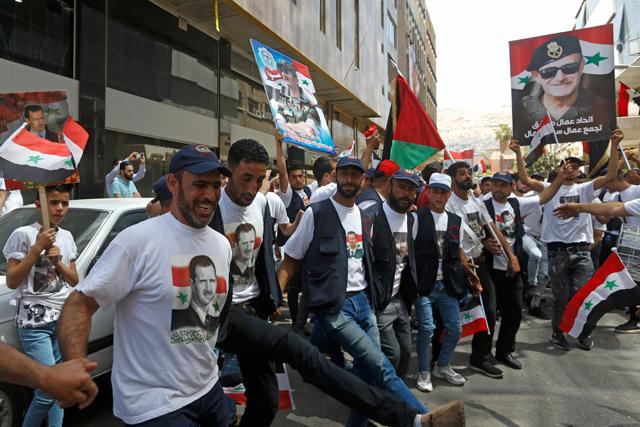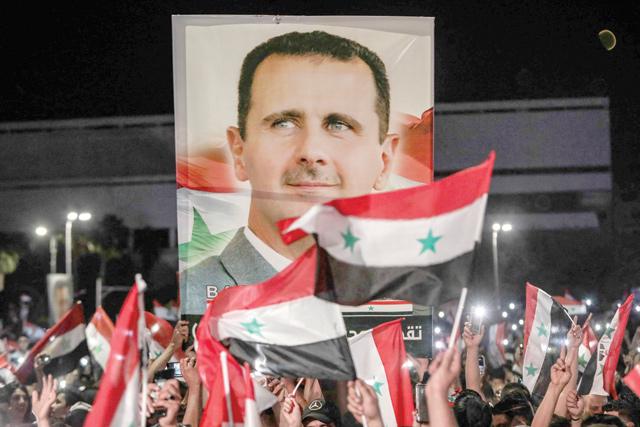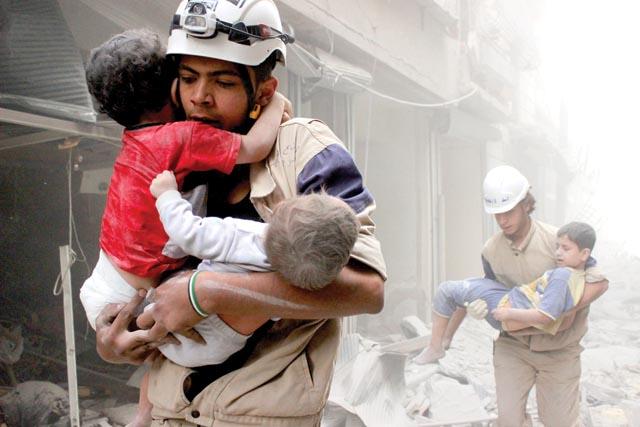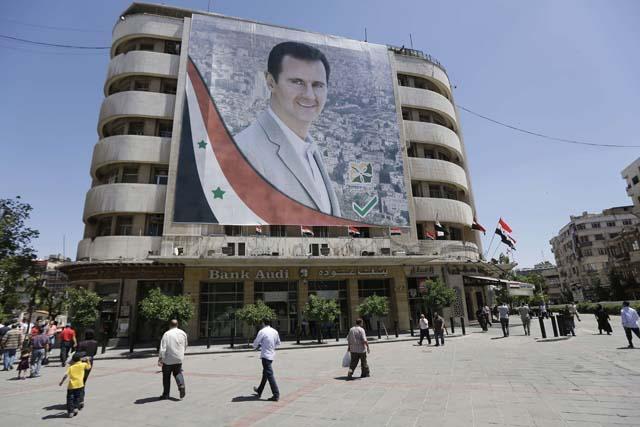You are here
War-ravaged Syria votes with Assad set to win
By AFP - May 26,2021 - Last updated at May 26,2021

Syrians dance outside a polling station in Damascus, on Wednesday (AFP photo)
DAMASCUS — Polls opened across Syria on Wednesday for a presidential election in which few doubt Bashar Assad will extend his grip on power for a fourth term, in a war-battered country mired in economic crisis.
The controversial vote is the second election since the start of a decade-long civil war, that has killed more than 388,000 people and displaced half the pre-war population.
Huge election posters glorifying Assad have mushroomed across the two-thirds of the country under government rule.
With opponents abroad barred from standing and no voting in the swathes of territory outside his control, Assad faces two virtually unknown challengers.
The state SANA news agency SANA declared voting had started as planned at 7:00am (04:00 GMT) and state television showed long queues forming amid tight security.
Hundreds of students clamoured to vote outside Damascus University.
“I came to vote for Bashar Assad because he is the only man who withstood 10 years of war,” said 26-year-old Kinan Al Khatib.
Around him, students chanted the slogan used to express support for strongmen around the Arab world: “With our blood and with our souls, we sacrifice our lives for you, Bashar.”
Syrians can cast their ballots at more than 12,000 polling stations, and results are expected to be announced by Friday evening, 48 hours after polls close.
The election takes place amid the lowest levels of violence since 2011 — but with an economy in freefall.
More than 80 per cent of the population live below the poverty line, and the Syrian pound has plunged in value against the dollar, causing skyrocketing inflation.
Assad’s campaign slogan, “Hope through work”, evokes the colossal reconstruction needed to rebuild the country, requiring billions of dollars in funding.
‘Tolerated opposition’
Assad, a 55-year-old ophthalmologist by training, was first elected by referendum in 2000 after the death of his father Hafez, who had ruled Syria for 30 years.
He faces former state minister Abdallah Salloum Abdallah and Mahmud Merhi, a member of the so-called “tolerated opposition”, long dismissed by exiled opposition leaders as an extension of the regime.
“I don’t know the other candidates at all and I respect their nomination but my vote will definitely go to Assad,” Khatib said.
Assad has refrained from holding campaign media events and interviews.
But he issued a general amnesty for thousands of prisoners earlier this month, on top of a series of decrees that aim to improve economic conditions.
Interior Minister Mohammad Khaled Al Rahmoun said on Tuesday that 18 million Syrians at home and abroad were eligible to vote.
Last week, thousands of Syrians abroad with the right paperwork cast early ballots in their embassies.
But those who had fled the country illegally — and so who could not show an exit stamp in their passport — were barred from voting.
Several countries that oppose Assad blocked the vote altogether, including Turkey and Germany, which host large Syrian refugee populations.
‘Farce’
The United States and the European Union said Tuesday the election was “neither free nor fair”, and Syria’s fragmented opposition has called the polls a “farce”.
But they will watch powerless as Assad prepares to renew his grip on power.
In rebel-held northwestern Syria, home to 3 million people, opposition activists distributed mock campaign posters ridiculing Assad.
Kurdish authorities, who have carved out an autonomous zone in the northeast, said they are “not concerned” with the election.
In the last multicandidate poll in 2014, Assad took 88 per cent of the vote.
It was Syria’s first contested election in nearly 50 years, after Assad and his father Hafez repeatedly renewed their mandates by referendum.
It took place as the war raged, with the air force bombing rebel areas of second city Aleppo and fierce fighting in Hama, Idlib and Daraa, as well as the capital Damascus.
This time around, the front lines are relatively quiet.
“Assad is running the risk of being the only certainty in a country in ruins,” a European diplomat said.
Related Articles
DAMASCUS — Bashar Al Assad has been reelected for a fourth term as president of war-ravaged Syria, official results showed on Thursday, desp
Syria geared up Monday for an election expected to keep Bashar Assad as president but derided as a “farce” and only staged in regime-held parts of the war-ravaged country.
Syria entered its final day of campaigning on Sunday for the June 3 presidential election expected to return Bashar Assad to power, a vote the opposition brands a “parody of democracy”.


















